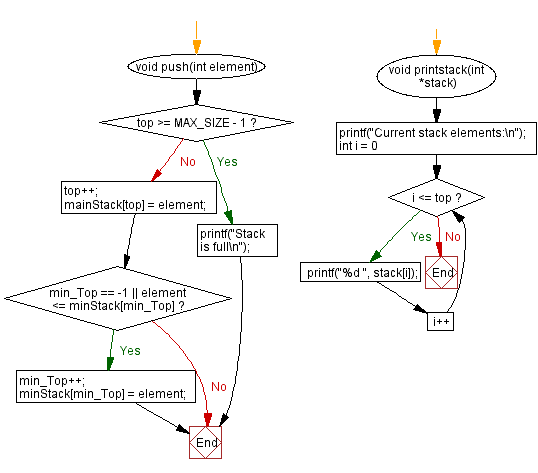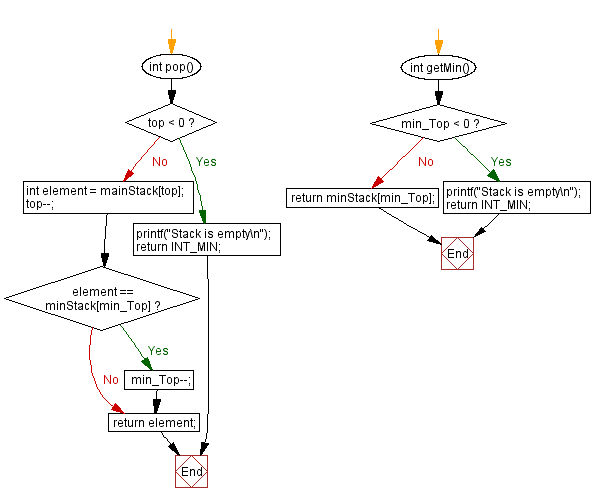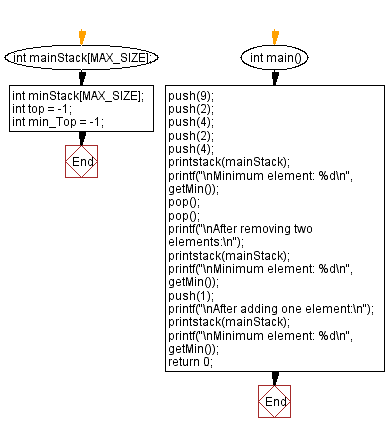C Exercises: Find the minimum element in a stack
11. Minimum Element in Stack Variants
Write a C program to find the minimum element in a stack.
Sample Solution:
C Code:
#include <stdio.h>
#include <stdlib.h>
#include <limits.h>
#define MAX_SIZE 100
// Arrays to maintain the main stack and the stack for tracking minimum elements
int mainStack[MAX_SIZE];
int minStack[MAX_SIZE];
int top = -1; // Top index of the main stack
int min_Top = -1; // Top index of the minimum stack
// Function to push an element onto the main stack
void push(int element) {
if (top >= MAX_SIZE - 1) {
printf("Stack is full\n");
return;
}
// Push the element onto the main stack
top++;
mainStack[top] = element;
// If the minStack is empty or the element is less than or equal to the top element in minStack,
// push the element onto the minStack to track minimum elements
if (min_Top == -1 || element <= minStack[min_Top]) {
min_Top++;
minStack[min_Top] = element;
}
}
// Function to pop an element from the main stack
int pop() {
if (top < 0) {
printf("Stack is empty\n");
return INT_MIN;
}
// Pop the top element from the main stack
int element = mainStack[top];
top--;
// If the popped element is the top element in minStack, also pop it from minStack
if (element == minStack[min_Top]) {
min_Top--;
}
return element;
}
// Function to get the minimum element from the main stack
int getMin() {
if (min_Top < 0) {
printf("Stack is empty\n");
return INT_MIN;
}
return minStack[min_Top];
}
// Function to print the elements of the stack
void printstack(int *stack) {
printf("Current stack elements:\n");
for (int i = 0; i <= top; i++) {
printf("%d ", stack[i]);
}
}
int main() {
// Example usage of the stack functions
push(9);
push(2);
push(4);
push(2);
push(4);
printstack(mainStack);
printf("\nMinimum element: %d\n", getMin());
pop();
pop();
printf("\nAfter removing two elements:\n");
printstack(mainStack);
printf("\nMinimum element: %d\n", getMin());
push(1);
printf("\nAfter adding one element:\n");
printstack(mainStack);
printf("\nMinimum element: %d\n", getMin());
return 0;
}
Output:
Current stack elements: 9 2 4 2 4 Minimum element: 2 After removing two elements: Current stack elements: 9 2 4 Minimum element: 2 After adding one element: Current stack elements: 9 2 4 1 Minimum element: 1
Flowchart:



For more Practice: Solve these Related Problems:
- Write a C program to find the second minimum element in a stack without sorting the stack.
- Write a C program to implement a stack that retrieves the minimum element in O(1) time using an auxiliary stack.
- Write a C program to remove the minimum element from a stack while preserving the order of the remaining elements.
- Write a C program to display the current minimum element in the stack after each push or pop operation.
Go to:
PREV : Reverse Stack Using Stack Ops.
NEXT : Maximum Element in Stack Variants.
C Programming Code Editor:
Have another way to solve this solution? Contribute your code (and comments) through Disqus.
What is the difficulty level of this exercise?
Test your Programming skills with w3resource's quiz.
